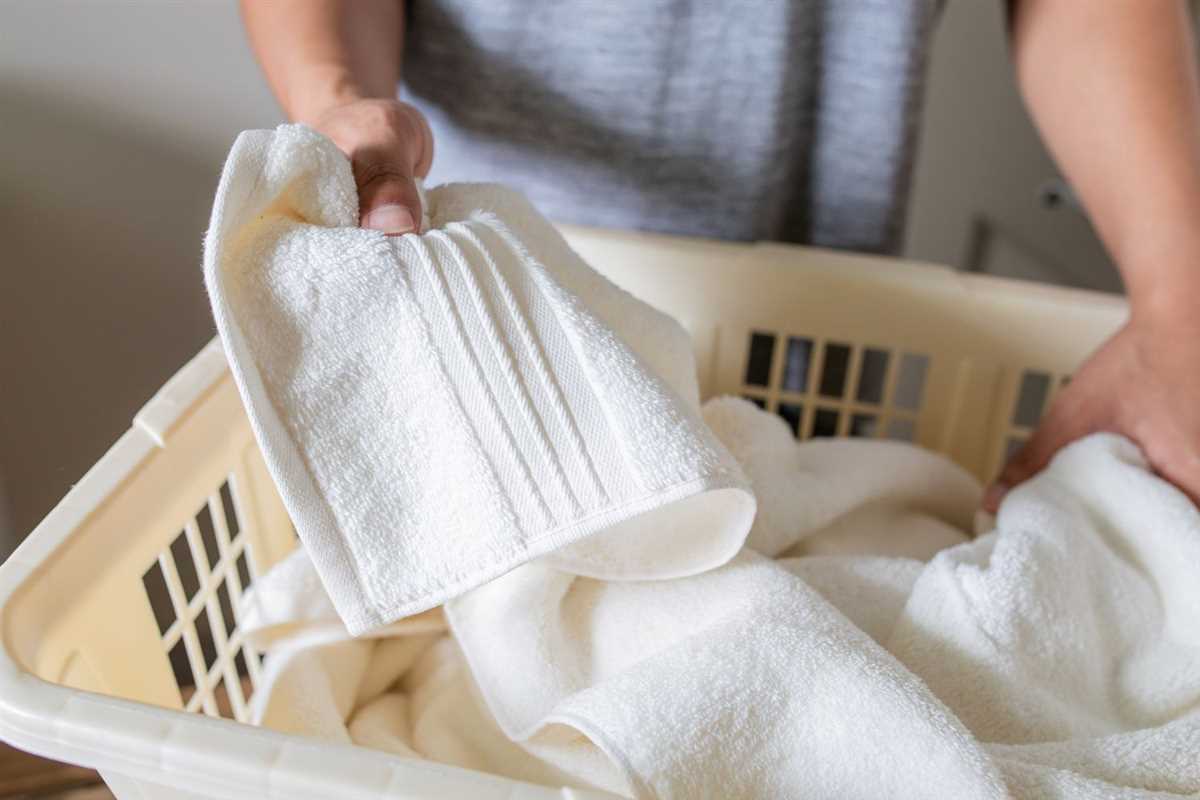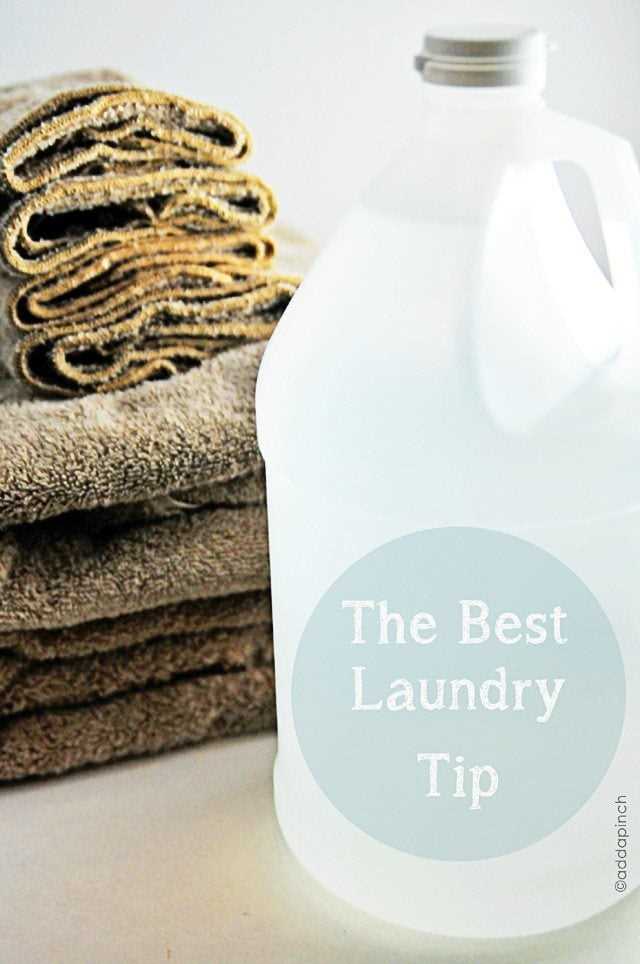


There are many household cleaning myths that have been passed down from generation to generation, and one of the most common ones is whether vinegar and laundry detergent can be used together. Some people swear by this combination, claiming that it can make your clothes cleaner and fresher, while others argue that it can damage your washing machine and decrease the effectiveness of your detergent. So, is it a myth or a fact?
First, let’s look at the role of vinegar in laundry. Vinegar is known for its natural cleaning properties and has been used for centuries as a natural alternative to harsh chemicals. It can help remove odors, break down stains, and even soften fabrics. Many people use vinegar as a fabric softener in their laundry, adding it to the rinse cycle to help prevent static and make clothes feel softer.
On the other hand, laundry detergent is specifically formulated to remove dirt, stains, and odors from clothes. It contains surfactants that work by lifting dirt particles from the fabric and suspending them in the water, allowing them to be rinsed away. Laundry detergents also often contain enzymes that break down proteins, fats, and other organic compounds that cause stains and odors.
Benefits of Using Vinegar and Laundry Detergent Together
1. Better Stain Removal
Combining vinegar with laundry detergent can help improve stain removal. Vinegar is known for its acidic properties, which can break down tough stains like grease, oil, and grass. When used together with laundry detergent, it can enhance the detergent’s ability to remove stains effectively.
2. Odor Elimination
Vinegar has natural deodorizing properties that can help eliminate unpleasant odors. When added to laundry detergent, it can help neutralize odors from sweat, smoke, and other sources, leaving your clothes smelling fresh and clean.
3. Fabric Softening

Vinegar acts as a natural fabric softener and can help make your clothes feel softer. When used in combination with laundry detergent, it can help reduce stiffness in fabrics, making them more comfortable to wear.
4. Brighter Colors
Vinegar can help keep your colored clothes vibrant and prevent them from fading over time. When added to laundry detergent, it can act as a fabric brightener, helping to maintain the original brightness and color of your garments.
5. Environmentally Friendly Alternative
Using vinegar in combination with laundry detergent is an eco-friendly alternative to traditional fabric softeners and stain removers. Vinegar is a natural, non-toxic substance that is safe for the environment, unlike some chemical-based laundry products.
6. Cost-Effective Solution
Using vinegar alongside laundry detergent can be a cost-effective solution for your laundry needs. Vinegar is an inexpensive household item that can be easily purchased in large quantities. By using vinegar, you can save money on commercial fabric softeners and stain removers.
Conclusion
Combining vinegar with laundry detergent can offer numerous benefits, including better stain removal, odor elimination, fabric softening, brighter colors, environmental friendliness, and cost-effectiveness. Experiment with the amount of vinegar you use until you find the right balance for your laundry needs. However, keep in mind that vinegar does not work well with certain types of fabrics, such as silk or acetate, so it’s important to check garment labels and proceed with caution.
Maintaining Fabric Color and Brightness
When it comes to maintaining fabric color and brightness, there are a few key factors to consider:
1. Separating Clothing
One of the simplest ways to prevent color bleeding and preserve fabric brightness is by separating clothing based on color. Sort your laundry into separate piles of whites, lights, and darks before washing.
2. Using Vinegar
While some believe that vinegar can help maintain fabric color, it is important to use it with caution. Vinegar can be used as a natural fabric softener and can help remove odors, but excessive use may cause damage to certain types of fabrics. It is recommended to perform a patch test on a small, inconspicuous area of the fabric before using vinegar on the entire garment.
3. Choosing the Right Laundry Detergent
Using a high-quality laundry detergent specifically designed for colored fabrics can help maintain their brightness. Look for detergents that are labeled as color-safe or color-protecting. These detergents are formulated to remove stains and dirt without fading or dulling the fabric color.
4. Washing in Cold Water
Washing colored fabrics in cold water can help preserve their color and prevent fading. Hot water can cause dyes to bleed and fade more quickly. Additionally, using a gentle cycle and avoiding harsh agitation can also help prevent color loss.
5. Avoiding Overloading the Washing Machine
Overloading the washing machine can lead to insufficient agitation and cleaning, which can result in dull-looking fabrics. Make sure not to overload the machine and follow the manufacturer’s guidelines for maximum load capacity.
6. Air Drying
Instead of using a dryer, consider air drying your colored fabrics to prevent heat damage and fading. Hang them on a clothesline or lay them flat on a clean surface, away from direct sunlight.
7. Treating Stains Immediately
Stains can become set and more difficult to remove over time. It is important to treat stains promptly to prevent them from permanently damaging the fabric color. Follow the stain removal instructions on the detergent or use a stain remover specifically designed for the type of stain.
8. Avoiding Direct Sunlight
Direct sunlight can cause fading in fabrics, especially those that are already exposed to long periods of sunlight. Whenever possible, try to store colored fabrics away from direct sunlight or use window treatments to block out UV rays.
By following these tips, you can help maintain the color and brightness of your fabrics, keeping them looking vibrant and fresh for longer.
Fighting Tough Stains and Odors
When it comes to doing laundry, dealing with tough stains and odors can be a challenge. Thankfully, you can use a combination of vinegar and laundry detergent to effectively tackle these common laundry issues.
Vinegar for Stains
Vinegar is a versatile and affordable household ingredient that can help remove a wide range of stains from your clothes. Its acidic properties make it effective for breaking down and dislodging various types of stains, including grease, oil, sweat, and even red wine stains.
To use vinegar for stain removal, follow these steps:
- Identify the stain and pre-treat it by blotting or scraping off any excess substance.
- Create a vinegar solution by mixing equal parts water and white vinegar.
- Apply the vinegar solution directly to the stain and let it sit for a few minutes.
- Gently rub the stained area with a clean cloth or soft brush to loosen the stain.
- Wash the garment as usual with your regular laundry detergent.
Remember to always check the care label on your clothing to ensure it can withstand vinegar treatment.
Vinegar for Odors
Vinegar is also effective in removing unpleasant odors from laundry. It acts as a natural deodorizer and helps eliminate stubborn smells caused by sweat, mildew, or other sources.
To use vinegar for odor removal, follow these steps:
- Add 1/2 to 1 cup of white vinegar into the fabric softener dispenser or directly into the rinse cycle.
- Let the washing machine complete its cycle as usual.
Alternatively, you can also soak the smelly garment in a mixture of water and vinegar for 30 minutes before washing.
Combining Vinegar and Laundry Detergent
For tough stains and odors, you can combine vinegar and laundry detergent for maximum cleaning power. The vinegar helps break down stains and eliminate odors, while the laundry detergent provides additional cleaning agents.
To use vinegar and laundry detergent together:
- Pre-treat the stain with the vinegar solution as mentioned earlier.
- Wash the garment with your regular laundry detergent and add 1/2 to 1 cup of vinegar to the wash cycle.
This combination can help tackle even the most stubborn stains and leave your clothes smelling fresh and clean.
| Advantages of using vinegar for stains and odors: | Disadvantages of using vinegar for stains and odors: |
|---|---|
|
|
Increasing Laundry Detergent Effectiveness
Adding vinegar to your laundry detergent:
There is a common belief that adding vinegar to your laundry detergent can increase its effectiveness. However, this is a myth that has been perpetuated over time. While vinegar can serve as a natural fabric softener and deodorizer, it does not enhance the cleaning power of your laundry detergent.
Vinegar is an acid, and when mixed with laundry detergent, which is usually alkaline, they cancel each other out. This means that their cleaning properties are diminished when used together. Instead of improving the performance of your detergent, using vinegar with laundry detergent can potentially neutralize the detergent’s cleaning power.
Tips for maximizing laundry detergent effectiveness:
- Use the recommended amount: When using laundry detergent, it is important to follow the instructions on the packaging. Using more detergent than necessary does not necessarily lead to cleaner clothes. In fact, using too much detergent can leave residue on your clothes, leading to a dull appearance and potential skin irritation.
- Pre-treat stains: For tough stains, it is recommended to pre-treat them before washing. This can be done by applying a stain remover or a small amount of laundry detergent directly to the stain, gently rubbing it in, and allowing it to sit for a few minutes before washing.
- Sort your laundry: Sort your laundry into different piles based on color and fabric type. Washing different fabrics and colors together can result in color bleeding and damage to delicate fabrics. By sorting your laundry, you can ensure that each load receives the appropriate amount of detergent and water temperature.
- Consider water hardness: The hardness of your water can affect the performance of your laundry detergent. If you live in an area with hard water, which contains high levels of minerals, you may need to use more detergent to achieve the desired results. Alternatively, you can consider using a water softener or laundry detergent specifically formulated for hard water.
Conclusion:
While adding vinegar to your laundry may have some benefits as a fabric softener and deodorizer, it does not enhance the cleaning power of your laundry detergent. To maximize the effectiveness of your detergent, it is important to use the recommended amount, pre-treat stains, sort your laundry, and consider the hardness of your water. By following these tips, you can ensure that your clothes come out clean and fresh.
Natural Alternative to Chemical Cleaners
Many people are becoming increasingly concerned about the harmful effects of chemical cleaners on their health and the environment. Fortunately, there are natural alternatives that can be just as effective at cleaning while being safer and more eco-friendly.
Vinegar
Vinegar is a versatile natural cleaner that can be used in a variety of ways. It has antimicrobial properties, making it effective at killing bacteria and viruses. You can use vinegar to clean windows, countertops, floors, and even laundry.
To use vinegar as a natural laundry cleaner, simply add half a cup of white vinegar to your washing machine’s rinse cycle. This will help to remove odors and break down any residue left behind by laundry detergent. Vinegar can also help to brighten whites and prevent colors from fading.
Baking Soda

Baking soda is another natural cleaner that is readily available and inexpensive. It has mild abrasive properties, making it effective at removing stubborn stains and odors. You can use baking soda to clean sinks, toilets, and even carpets.
To use baking soda as a natural laundry cleaner, add half a cup to a cup of baking soda to your washing machine along with your regular detergent. Baking soda can help to boost the cleaning power of your detergent and remove any lingering odors in your clothes.
Lemon Juice
Lemon juice is a natural bleach and deodorizer that can be used to clean a variety of surfaces. It is particularly effective at removing stains and odors from fabrics. Lemon juice can also help to brighten whites and remove rust stains.
To use lemon juice as a natural laundry cleaner, simply add the juice of half a lemon to your washing machine along with your detergent. Lemon juice can help to freshen up your clothes and remove any tough stains.
Conclusion
Using natural alternatives like vinegar, baking soda, and lemon juice can be a great way to reduce your exposure to harmful chemicals and protect the environment. These natural cleaners can be just as effective as their chemical counterparts, giving you peace of mind while keeping your home clean.
Saving Money on Laundry Products

Doing laundry can be expensive, especially when you factor in the cost of laundry detergent and other laundry products. However, there are a few ways you can save money on these items:
1. Make your own laundry detergent
One cost-saving solution is to make your own laundry detergent. There are many recipes available online that use simple ingredients like borax, washing soda, and grated soap. Making your own detergent can be cost-effective and eco-friendly.
2. Use vinegar as a fabric softener
Instead of buying expensive fabric softeners, you can save money by using vinegar as a natural alternative. Simply add half a cup of vinegar to the rinse cycle, and your clothes will come out soft and fresh. Vinegar also helps to remove any residual detergent, resulting in cleaner laundry.
3. Opt for the generic brand
Many generic laundry products offer similar performance to their brand-name counterparts at a fraction of the price. Consider trying out a generic brand of laundry detergent, stain remover, or bleach to save money without compromising on quality.
4. Use less detergent
You may be using more laundry detergent than necessary, which can add unnecessary costs. Most laundry detergent bottles recommend using a full cap, but often you can achieve the same results with half that amount. Experiment with using less detergent to determine how much is truly needed for your laundry loads.
5. Look for sales and coupons
Keep an eye out for sales and coupons on laundry products. Many stores offer discounts or promotions on these items, especially during certain seasons. Check for coupons in newspapers, online deal websites, or sign up for newsletters from your favorite brands to stay up to date with any savings opportunities.
6. Extend the life of your laundry products
To make your laundry products last longer, remember to properly measure your detergent and avoid overcrowding the washing machine. Using the correct amount of detergent and not overloading the machine will ensure that your products are used efficiently and effectively.
Conclusion
By following these money-saving tips, you can reduce the amount you spend on laundry products. Whether it’s making your own detergent, using vinegar as a fabric softener, or opting for generic brands, there are plenty of ways to keep your laundry routine budget-friendly without sacrificing cleanliness and freshness.
FAQ
Can vinegar and laundry detergent be used together?
Yes, vinegar and laundry detergent can be used together. In fact, using vinegar as a laundry additive can have several benefits. Vinegar can help to remove odors from clothes, brighten colors, and even soften fabrics. It is safe to use vinegar alongside your regular laundry detergent.
How should vinegar be used with laundry detergent?
Vinegar can be added to the washing machine along with your regular laundry detergent. The amount of vinegar you use will depend on the size of your load and the specific instructions on the vinegar bottle. Generally, adding 1/2 to 1 cup of vinegar to the rinse cycle is recommended. This will help to remove any detergent residue and leave your clothes smelling fresh.
Is it safe to mix vinegar and laundry detergent?
Yes, it is safe to mix vinegar and laundry detergent. Vinegar is a natural and non-toxic product that can be used as a cleaning agent and fabric softener. It is safe to use alongside your regular laundry detergent and will not cause any harm to your clothes or washing machine.
What are the benefits of using vinegar and laundry detergent together?
Using vinegar and laundry detergent together can have several benefits. Vinegar can help to remove odors from clothes, brighten colors, and soften fabrics. It can also help to remove detergent residue and prevent the buildup of soap scum in your washing machine. Additionally, vinegar is a natural and non-toxic alternative to chemicals and can be more environmentally friendly.
Are there any drawbacks to using vinegar and laundry detergent together?
While there are many benefits to using vinegar and laundry detergent together, there are a few potential drawbacks to be aware of. Vinegar has a strong smell, which some people may find unpleasant. However, the smell should dissipate once the clothes are dry. Additionally, vinegar is acidic and should not be used on delicate fabrics such as silk or wool, as it may cause damage.
Can vinegar and laundry detergent be used together?
Yes, vinegar and laundry detergent can be used together in the same load of laundry. In fact, many people use vinegar as a natural fabric softener and to remove odors from their clothing. Simply add a cup of vinegar to the fabric softener dispenser or during the rinse cycle to see the benefits.












